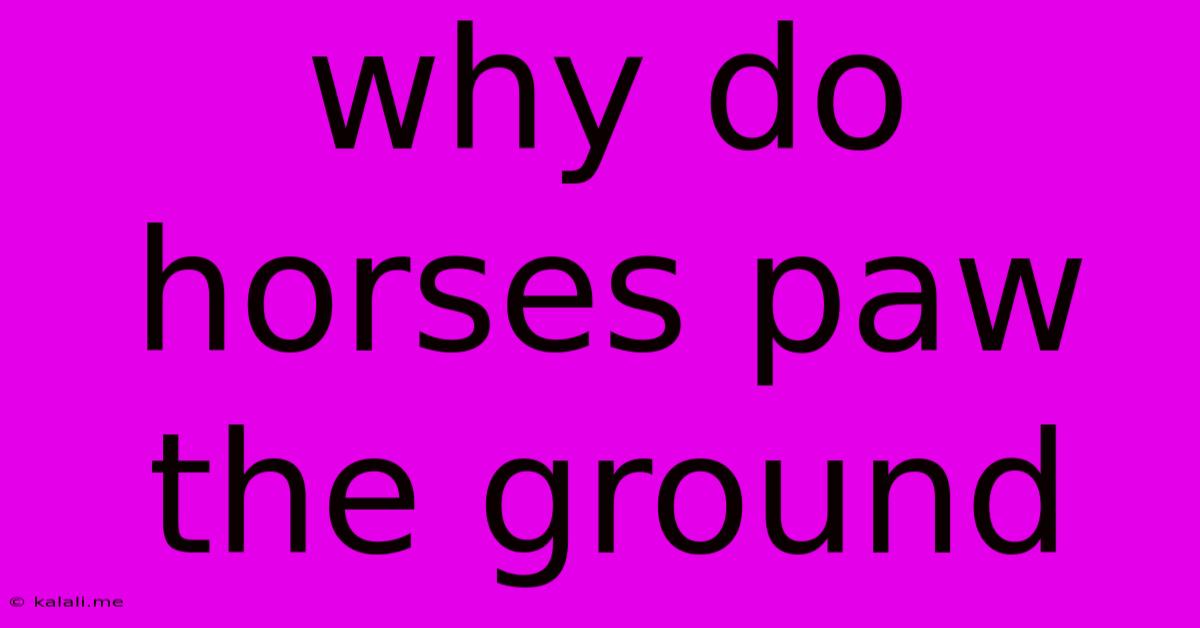Why Do Horses Paw The Ground
Kalali
May 21, 2025 · 3 min read

Table of Contents
Why Do Horses Paw the Ground? Decoding Equine Body Language
Horses are complex creatures with a rich and nuanced communication system. Understanding their behavior, especially seemingly simple actions like pawing the ground, is key to building a strong bond and ensuring their well-being. This article delves into the various reasons why horses paw the ground, exploring the underlying motivations and context behind this common behavior.
Why do horses paw the ground? The answer isn't always straightforward, as pawing can signify a range of emotions and needs. It's a multifaceted behavior that often depends on the horse's surroundings, their body language, and the overall situation. Let's explore the most common reasons:
Impatience and Anticipation
One of the most frequent reasons for pawing is simple impatience. Think of a horse waiting for their feed, their rider, or a release from a holding area. The rhythmic tapping of their hooves can be interpreted as a display of restless energy and pent-up anticipation. This type of pawing is often accompanied by other signs of excitement, such as shifting weight, head tossing, or whinnying. It's a physical manifestation of their eagerness.
Discomfort and Frustration
Pawing can also be a sign of discomfort or frustration. This might be due to several factors: flies buzzing around their legs, an uncomfortable fly mask, a tight girth, or even simply the discomfort of standing still for extended periods. Horses are naturally built to move, and prolonged inactivity can lead to physical restlessness. Pay close attention to the horse's overall demeanor; if the pawing is accompanied by swishing of the tail, stomping, or other signs of irritation, it's crucial to investigate the source of their discomfort.
Seeking Attention and Communication
Horses are social animals, and pawing can sometimes be a way of seeking attention from their human companions or other horses in the herd. If a horse is pawing near a person, it might be attempting to communicate a need – be it for food, water, grooming, or simply a moment of interaction. This type of pawing is frequently accompanied by soft whinnies, attentive gazes, and other subtle attempts at engagement. It's a way for them to signal their presence and express their desire for connection.
Boredom and Lack of Stimulation
A horse that's bored or lacks sufficient mental and physical stimulation might also resort to pawing as a way to occupy themselves. This is particularly common in horses that spend long periods in stalls or paddocks with limited opportunities for exploration and social interaction. Environmental enrichment, such as providing toys, puzzle feeders, or regular turnout time, can help alleviate boredom-related pawing.
Medical Reasons
Finally, it's crucial to consider that pawing might sometimes be indicative of an underlying medical condition. Pain in the legs or hooves, colic, or other internal problems can cause discomfort that manifests as increased pawing. If the pawing is excessive, persistent, or accompanied by other concerning symptoms such as lethargy, lameness, or changes in appetite, it's essential to consult a veterinarian to rule out any underlying health issues. Always observe your horse for other subtle signs that might point towards a potential problem.
Understanding the context behind a horse's pawing is essential for responsible horse ownership. By paying attention to the overall situation, the horse's body language, and any accompanying behaviors, you can better interpret their needs and ensure their physical and emotional well-being. This deeper understanding strengthens the human-animal bond and allows for a more harmonious and fulfilling relationship.
Latest Posts
Latest Posts
-
Be Greater In Influence Or Quantity
May 21, 2025
-
When To Use Yours Faithfully And Sincerely
May 21, 2025
-
Are Aerosols Allowed In Checked Baggage
May 21, 2025
-
On A Light Switch What Is Common
May 21, 2025
-
Can I Mix Water With Coolant
May 21, 2025
Related Post
Thank you for visiting our website which covers about Why Do Horses Paw The Ground . We hope the information provided has been useful to you. Feel free to contact us if you have any questions or need further assistance. See you next time and don't miss to bookmark.